- Home
- Paul Finch
Medi-Evil 2 Page 3
Medi-Evil 2 Read online
Page 3
“And how about your flock, Anselm?” Eric wondered. “How do they like you? Or are there not enough of them left to have an opinion?”
“You fool!” Rolf snapped. “You think you can drift in here ragged and stinking, and throw insults at those who have striven to make something of themselves? Who have worked their fingers to the bone to make this land better than it was?”
“Better than it was!” Eric put his goblet down. “Have you been north?”
There was an awkward silence. Anselm glanced uneasily at Rolf.
“How about west?” Eric wondered. “You wouldn’t actually have to go very far, to pick up the army’s trail …”
Before anyone could reply, a hunting horn sounded in the near-distance. The three brothers exchanged glances. No explanation was needed. Their father was returning.
4
Ours was a kingdom of two islands: Ierne in the west and Albion in the east, the latter of the two named from our founding father. For centuries we lived unchecked, raising our crops and cattle, building our monuments and cutting images of ourselves on the hills. Then came the first invaders, the people of Partholon. In the resulting war they were all but annihilated, though much damage was done to the land. In the following years of famine and plague, the remainder of Partholon’s tribe died. We endured, however. As we always had. But shortly after this new invaders arrived on our shores, the people of Nemed. Less hardy than our first wave of enemies, these were also crushed in battle, and the survivors became our slaves. Next, the fearsome Fir Bolg assaulted us. Their attacks were concentrated in Ierne, and though we repulsed them repeatedly, our forces in that western realm were weakened. It was thus the wrong time for us to suddenly be faced by our deadliest foe to date, the mighty Tuatha De Danann.
Having heard via messenger that the bishop and his entourage had arrived, Count Dagobert and Turold wasted no time heading back towards the castle. The hunt had not been a waste as a twelve-point stag was already slumped over the pommel of Dagobert’s saddle, an arrow buried in its skull.
Once they had cantered away, mud flying from their hooves, a third horseman appeared, walking his animal out from the cover of the thorn-breaks. He was a squat, burly fellow with a pitted, peevish face and scars which ran up onto his shaven head, where they branched across his entire scalp.
“Count Dagobert flouts the king’s new forest laws as freely as these English rabble,” he told the two men-at-arms who appeared behind him.
With much shouting and tussling, they threw a prisoner at his feet; an English peasant covered in mud and blood, and bruised as though from a brutal beating. The peasant’s hands were bound so tightly at his back that his wrists were turning purple.
“Caught in the act, Lord Drogo,” one of the men-at-arms explained, holding up several fish as evidence
The shaven-headed man, who was called Drogo, smiled. “There’s only one penalty for that.”
The other man-at-arms threw a rope over the nearest branch. A noose was already tied at one end of it. The peasant squirmed in terror.
“It’s no surprise Count Dagobert fails to enforce the king’s rules on his own demesnes, when he sets so poor an example himself,” Drogo said. “But that’s by the by.” More men-at-arms now emerged from the thorn-breaks. Drogo climbed up into his saddle, and handed one of them a scroll. “Take this note to Wulfbury Castle, and don’t waste time. You, wait!” He pointed at the peasant, who’d now had the noose placed around his neck. “No rope for that one. Bring him with us.”
The peasant, who didn’t understand a word of their Norman-French, looked agreeably stunned when the rope was removed and he was lifted to his feet. When they pointed along the fenland road and ordered him to march, he wept with gratitude. For all his cuts and bruises he called praise down on his captors and, in particular on the Norman knight-commander, Drogo.
“Don’t look too pleased, fellow,” Drogo said with a smile. “You have a dinner date with the Korred.”
The other Normans laughed, and the peasant nodded and laughed with them. Wherever they were taking him, nothing could be worse than the fate he’d just avoided.
*
Count Dagobert’s rages were infamous.
In the heat of battle, he would ride down anyone who got in his path. He had no use for a shield, but would fight with a sword in one hand and an axe in the other. At Val-es-Dunes, he’d found himself disarmed, but had continued the struggle with his mailed fists, punching one rebel baron with such force that his skull was shattered. Maybe it was the inheritance of Dagobert’s sea-roving ancestry, or maybe some madness in his blood – a twisted nerve, or a lesion on his brain. Either way, when the wrath was on him, the colour drained from his face. He didn’t redden, he paled, horribly so, like a waxen corpse, his eyes widening, his nostrils flaring, his teeth bared between lips pulled taut and grey.
This was the expression they now saw as he came across the hall towards them. Rolf felt the hair prickle on the nape of his neck, though Dagobert’s piercing gaze was fixed on only one of his three sons: the ragged, bearded one. The count had already forgotten the stag carcass draped over his shoulder – it slid free and fell to floor. Behind him, Turold hastened to drag it out of the way.
By necessity, Norman folk in England had always to be armed, and Dagobert, for all his reputation, was no exception. That morning, as every morning when hunting, he had taken his longsword with him. He thus had it loose in the scabbard alongside him. Slowly, with a long rasp of steel, he drew it from the leather.
“Now father …” Rolf began.
“Father don’t be hasty!” Bishop Anselm added, but Dagobert raised the blade over his head and, with a bass roar, charged at Eric.
Wild shouting followed, Turold and Rolf attempting to wrestle the raging nobleman back, even the demure bishop setting his dignity aside to lend a hand. Eric backed away, staring with fascination at his father’s bulging eyes and frothing mouth.
“Get this carrion crow out of my sight!” Dagobert howled. “Turold … get him out! Get him out of this place! I’ll have no prodigal sons here!”
“Aren’t you glad to see I’m alive?” Eric asked.
“I have nothing to say to you, sirrah!” Dagobert roared, as the three men hustled him backwards.
Eric nodded. “Older but no wiser, I see.”
“Get him out!” Dagobert bellowed again. “Get him out of this place!”
“Father, you can’t just throw him out,” Rolf protested.
“Father … he’s destitute,” Anslem said. “And clearly exhausted ...”
“He’ll be more than exhausted …”
“At least give him a chance.”
Dagobert fought with them a moment longer, though colour was now returning to his face and the foam had dried on his lips. “How many chances does a man need?” he finally demanded.
“A chance to explain himself,” Anselm said. “Surely he’s owed that? I think we’d all like to know where he’s been.” He looked at Eric. “Before he vanishes again.”
The count’s breath hissed through his tight-locked teeth, his gloved hands clamping and unclamping, his ox-broad shoulders rising and falling. But his anger was subsiding. He threw the sword down, and it clattered on the flagstones.
Cautiously, they released him.
“Forgive me, your grace,” Dagobert finally said, taking Anselm’s hand and kissing the ring on it. “Welcome to Wulfbury.”
Anselm nodded. “My thanks, Count Dagobert.”
Dagobert thrust his way past them towards the banquet-table. Eric stepped nimbly out of his way, though this time his father ignored him, snatching up the wine-jug and filling a goblet. He took a deep drink, before rounding on them.
“We’ll speak anon, your grace,” he said, “but if you gentlemen wouldn’t mind …” and his eyes bored into his third son, “I’d like a few words with this miscreant first.”
Anselm made to withdraw. “Of course.”
Rolf remained where he was.
As seneschal and eldest son, no family business was unsuited for his ears.
“Rolf … you too, if you please,” Dagobert said.
“Father, I …”
“If you please!”
Anselm took his elder brother by the elbow and silently steered him from the hall. Turold, who had already, discreetly, picked up the discarded sword, followed them, closing the main door behind him. Eric and Dagobert watched each other over the table, the son shifting from foot to foot, the father raising the goblet to his lips again.
“You’re looking well,” Eric ventured.
With a burst of renewed anger, the count flung the goblet at him. It only missed Eric because he darted to one side, though its contents splashed over him.
“You young dog!” Dagobert shouted. “What do you look like? You were a fully-trained knight when you rode from Wulfbury. You had everything you needed to make your way in the world – money, horses, weapons. You had wits, courage, a talent for the tourney. And two years later, without a word in the meantime, you drag yourself back a pauper!”
“Many things have happened to me,” Eric tried to explain.
“Yes, I can imagine. Well … you won’t get anything else here. Nothing. You can have a meal and a bed for the night, and that’s all.”
“In making no contact, I thought I was doing you a favour,” Eric retorted. “Haven’t you always wanted to see the back of me?”
Then, with a wild shout, Rolf was in the room again. “Father …”
“Damn it!” Dagobert thundered. “I told you …”
“Father, the Vikings are coming!” Rolf shouted. Dagobert and Eric regarded him in astonished silence. He offered them a scroll, which he had just unrolled and read. “They’re on their way here … right as we speak!”
*
Dagobert stood by the hall’s east casement, gazing out over an empty sea. He read again through the scroll, which bore the royal seal.
“So now what?” Eric wondered. “With the household gone north, you may need me.”
Dagobert didn’t so much as look at him. “You’re no longer a knight, you say. You’ve forfeited the right to bear arms.”
Eric smiled thinly. “These are the Vikings, father. Their axes won’t discriminate.”
“Just get out of my sight.”
Eric stepped away, still smiling to himself, and left the room.
“Apparently they sail under Sveine Estrithson,” Rolf said.
Dagobert spat. “That piratical dog!”
The count sounded angry rather than unnerved, but Rolf didn’t doubt there’d be an element of bravado there. While the Viking warlords weren’t a shadow of the terror they had once been, this one in particular – Sveine Estrithson, king of Denmark – had rekindled some of the old fears. Not long before the Normans had arrived in England, a huge army of Vikings under Harald ‘Hardraada’, younger brother of the famed Christian Norseman, Olaf of Norway, had been slaughtered by the English at Stamford Bridge, but many observers had feared it would signal a new era of Viking ambition. And now Sveine Estrithson appeared to be fulfilling that promise. According to this post, delivered by one of barons attached to the king’s army, the Viking chief, after seeing the English rebels broken in the north, had left his fortified camp on the River Humber and was sailing south towards the Wash.
“He has three-hundred dragon ships,” Rolf said.
“More than enough to plunder the entire east coast,” Dagobert agreed.
“Is he planning to join Hereward and his rebels at Ely?”
“Obviously.”
“But if so, why is the king sending a royal army here?” Rolf referred to the second part of the message; namely that while Wulfbury was denuded of its regular soldiery, a royal force was being sent to bolster its defences.
Dagobert stared at his son in disbelief. “Rolf, you will soon be a baron of the realm. You must start thinking like one. The king doesn’t trust us.”
“But why?”
“For one thing we have Danish blood in our veins.”
“Aye, from centuries ago,” Rolf replied.
“That will suffice …”
“Father, father!” Trewan shouted, dashing in unbidden. Having stripped off his mail from earlier, he now wore only hose and a jerkin, but he was pink-faced and damp with sweat. “There are men coming. Along the fenland road.”
Dagobert moved to the western casements. Rolf and Trewan joined him.
The fen country spread out before them in a vast emerald mantle; where the sky reflected in its twisting meres, it was veined with shimmering blue. The road to Lincoln lay across it like a straight ribbon, and part way along this, perhaps quarter of a mile off, a party of horsemen was slowly approaching towing some item of heavy baggage at their rear.
“They didn’t waste anytime,” Dagobert said uneasily.
“But that can’t be the king’s army,” Rolf replied.
“Who else?”
“But so few?”
Dagobert shook his head. He couldn’t put his finger on it, and even had he been able to, he was always loath to voice fear. But something about that small, steadily advancing band put a chill in his bones.
5
On Cetshamain we celebrated the death of winter. Fires were lit, and our flocks and herds driven around them to invoke protection against any lingering spirits of the frost. Flaming brands would be taken through all the pastures and meadows to aid the spring-time as it sought to reawaken the land. Also on this day we adorned ourselves with sprigs of new foliage and danced in gay procession to the stone circles we had raised in honour of Belenos, the god of the sun, to welcome him back. Last, but most pleasurable of all, Cetshamain was a time for coupling, when, for one day only every lord would give his lady to another, and all that evening the young folk would meet in sacred hollows laid with fresh-plucked flowers, and new seed would be sewn.
Eric ascended to the keep’s residential apartments via a spiral stair, which led upwards from the main hall’s eastern door. He was creeping along the torch-lit passage connecting the various upper chambers, when a door on his left opened and a woman emerged in a white kirtle, wearing a linen veil around her lustrous bronze locks. She was tall and statuesque, imperious in her beauty. She immediately gave a smile of mock-surprise.
“Why, Eric?”
“Isabel …” Despite the years that had passed, it was impossible for him not to recognise Rolf’s lovely wife.
She offered her hand, which he stooped to kiss. “Does my husband know you’re here?” she asked.
Eric half-smiled. “Yes. He’s unimpressed.”
“And your father?”
“The same, I’m afraid.”
“We all thought you dead, Eric.”
“So did I.” He shrugged. “From time to time.”
“And where are you going now?” she asked in a studied way, which suggested she already knew perfectly well.
“I’m unsure. These upper tiers of the keep … they’re all new to me. Trying to familiarise myself.”
“I see. Well, don’t let me stop you.”
He nodded awkwardly, and stepped past her.
“Ella’s quarters are directly ahead of you,” she said after him.
He glanced back innocently. “Ella’s quarters?”
Isabel smiled. “I only mention it to help you familiarise yourself.”
“My thanks, Isabel.”
“With a swish of skirts, she strode down the corridor towards the top of the stair. “Don’t do anything foolish now.”
Thanking his stars it had been his sister-in-law who had spotted him and not someone else, Eric moved on to the end-door. A lute was being played on the other side, and a voice was singing in English, which Eric – though he wouldn’t admit it to his family – now understood as well as his own tongue. The voice was beautiful, haunting, and he remembered it well. It belonged to Agnes, Ella’s bower-maid.
Are you going to Scarborough Fair?
Parsley, sage,
rosemary and thyme ...
Remember me to one who lives there ...
She once was a true love of mine.
Eric tapped on the door and entered. Beyond it was a relatively small chamber, with a low ceiling. Sheepskin rugs lined the floor, and hand-woven cloths adorned the walls. To one side, on a stool beside the bed, Agnes was strumming her instrument. She saw Eric, but remained blank-faced and continued with her song.
Tell her to make me a cambric shirt ...
Parsley, sage, rosemary and thyme.
In the centre of the room, seated in front of a loom and crochet-board but with her back turned, a young, fair-haired girl worked on an embroidery of her own design. Eric still thought of her as young, though she had blossomed since he had last seen her. She had been eighteen then, and though comely as any lass could be at that age, the years had been more than kind to her since. Her figure was now curved as a woman’s should be. The shining flaxen locks he’d so often buried his face in, hung past her waist.
Without no seams nor needlework ..
Then she’ll be a true love of mine.
Eric had heard the English folksong many times of course. After the events of the last few years, it touched him ways that neither the Chansons de Geste nor the Song of Roland ever could. He stood in silence, his back against the chamber wall.
Tell her to find me an acre of land.
Parsley, sage, rosemary and thyme.
Between the salt water and the sea strands ...
Then she’ll be a true love of mine.
Ella continued embroidering with delicate skill. Whatever image she was weaving, it was complex and colourful. It briefly caught Eric’s eye, though not sufficiently to distract him from the song, which now invoked frightful images in his mind: peasants fleeing along muddy roads strewn with bodies; mounted knights cantering in pursuit; cottages and longhouses burning; English gospels and almanacs, beautifully illustrated, built into bonfires and set alight to.

 Stolen
Stolen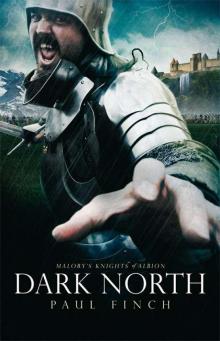 Dark North mkoa-3
Dark North mkoa-3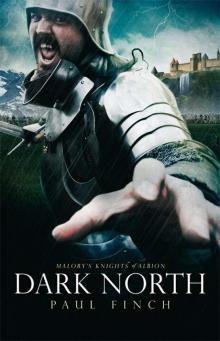 Dark North (Malory's Knights of Albion)
Dark North (Malory's Knights of Albion)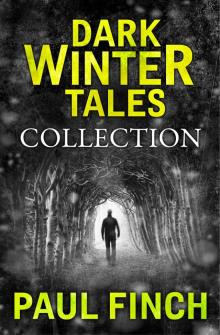 a collection of horror short stories
a collection of horror short stories Sacrifice
Sacrifice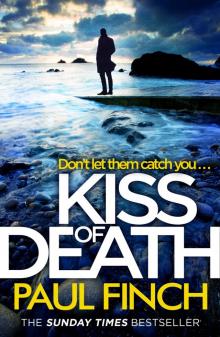 Kiss of Death
Kiss of Death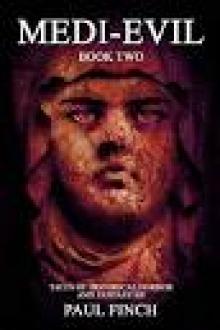 Medi-Evil 2
Medi-Evil 2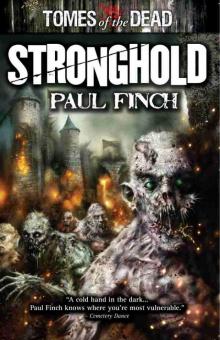 Stronghold
Stronghold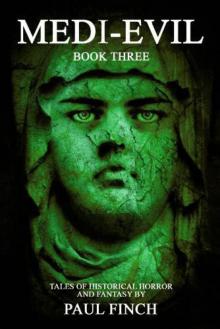 Medi-Evil 3
Medi-Evil 3 Dead Man Walking
Dead Man Walking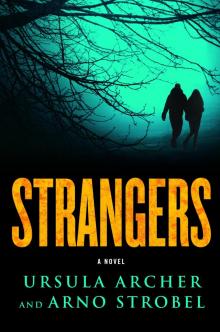 Strangers
Strangers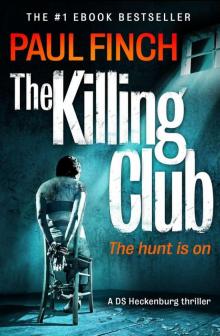 The Killing Club
The Killing Club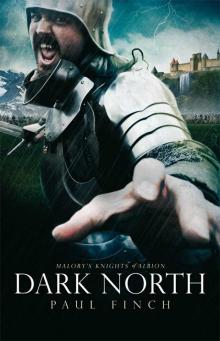 Dark North
Dark North A Wanted Man
A Wanted Man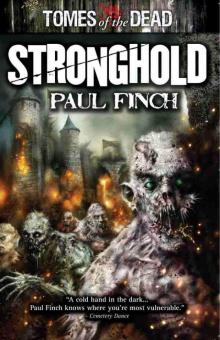 Stronghold (tomes of the dead)
Stronghold (tomes of the dead) Hunted
Hunted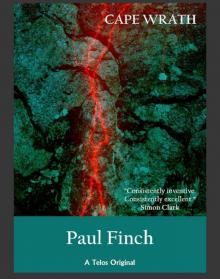 Cape Wrath
Cape Wrath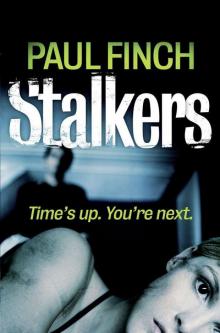 Stalkers
Stalkers The Burning Man
The Burning Man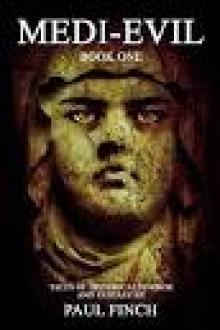 Medi-Evil 1
Medi-Evil 1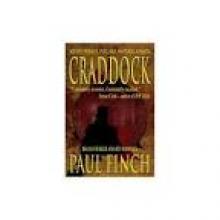 Craddock
Craddock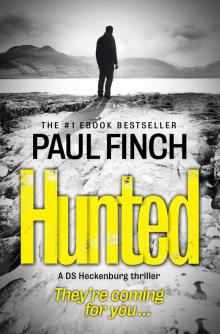 Hunted (Detective Mark Heckenburg Book 5)
Hunted (Detective Mark Heckenburg Book 5)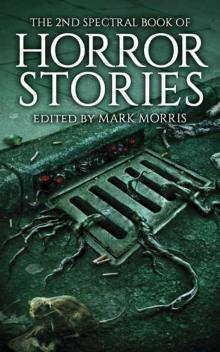 2nd Spectral Book of Horror Stories
2nd Spectral Book of Horror Stories The Chase
The Chase